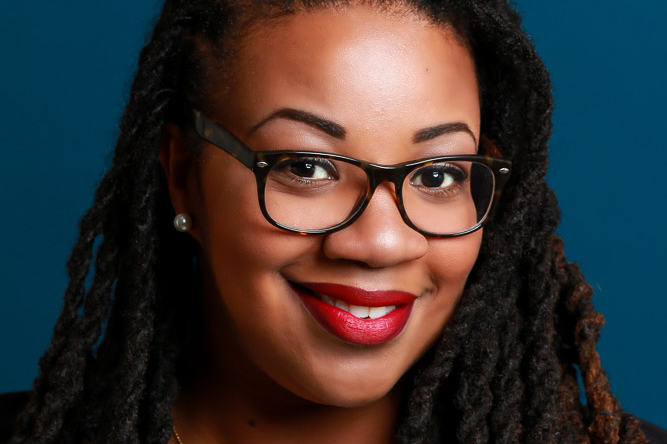Assistant Professor Tiffany Atkins L’11 took part in a “Life After Student Debt” panel discussion at Bennett College presented by the Greensboro Commission on the Status of Women and the city's Human Relations Commission.
An Elon Law faculty member discussed the student loan crisis, sharing details of her journey to the legal profession—and how student loans helped made that career possible—in an evening program presented by the Greensboro Commission on the Status of Women and the city’s Human Relations Commission.
Assistant Professor Tiffany Atkins L’11 was one of five panelists for “Life After Student Debt” on February 27, 2020, on the campus of Bennett College in Greensboro.
The program was geared toward high school seniors, and budding and seasoned professionals with debt. It focused on the intersections of women and identity.
Organizers of the panel asked Atkins to address two salient questions: how has she been impacted by student debt, and does she believe debt was an important step to get where she is today?
Atkins said that as a first-generation college student without financial resources to pay for school outright, student loans were definitely important. Although borrowers tend to be criticized for what many consider “irresponsible borrowing habits, poor financial planning, or a combination of the two . . . without student loans, I would not have become the first college graduate, lawyer, or law professor in my family.”
“While there are surely some who have abused the accessibility of student loan dollars, for many first-generation students, like myself, student loans are the only way to obtain first-gen status at all,” Atkins said. Atkins urged potential borrowers to use caution, only taking out what is absolutely necessary for school, and to also consider less expensive, non-traditional programs for their education.
Atkins is authoring a chapter for a forthcoming book that touches upon these topics. “They Got Next: How Xennial and Millennial Law Professors Can Prepare Generation Z to ‘Be The Change’ We Want to See in the Legal Academy” where she touches on these topics further.
Moderated by C’Mille Best and Roslynn ChouChan from the Greensboro Commission on the Status of Women, the panel included:
- Penny Iddings, mortgage specialist at Equity Mortgage
- Sofia Crisp, executive director at Housing Consultants Group
- Dionne Latham, an associate clinical researcher at Merck
- Debra Slade, assistant director for UNC Greensboro’s public relations office
The Commission on the Status of Women’s purpose is to improve the quality of life for women in Greensboro by holding educational programs and making recommendations to the City Council. This panel was part of its Education and Equality programming.
Atkins graduated from Elon Law in the Class of 2011 where she was the recipient of the David Gergen Award for Leadership and Professionalism. She served Elon Law as a Legal Method & Communication Fellow from 2016-2018 then taught in Wake Law’s Legal Analysis, Writing and Research program for a year before rejoining Elon Law.
Prior to her entry into legal education, Atkins worked for several years in Greensboro at Legal Aid of North Carolina. She is a graduate of UNC Greensboro’s Political Science and African-American Studies programs.



